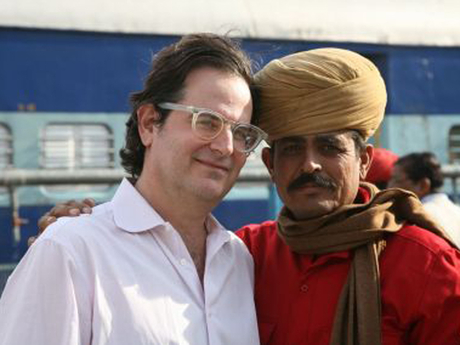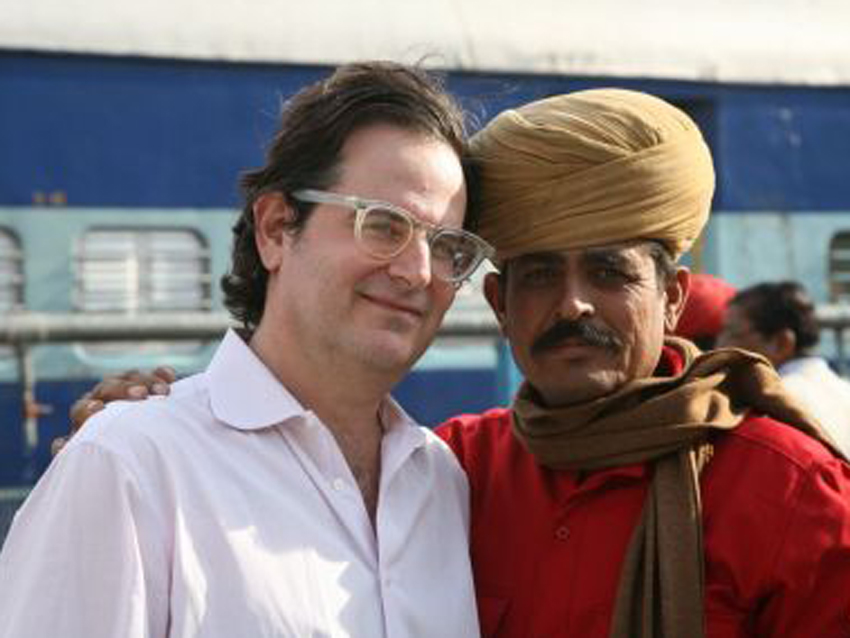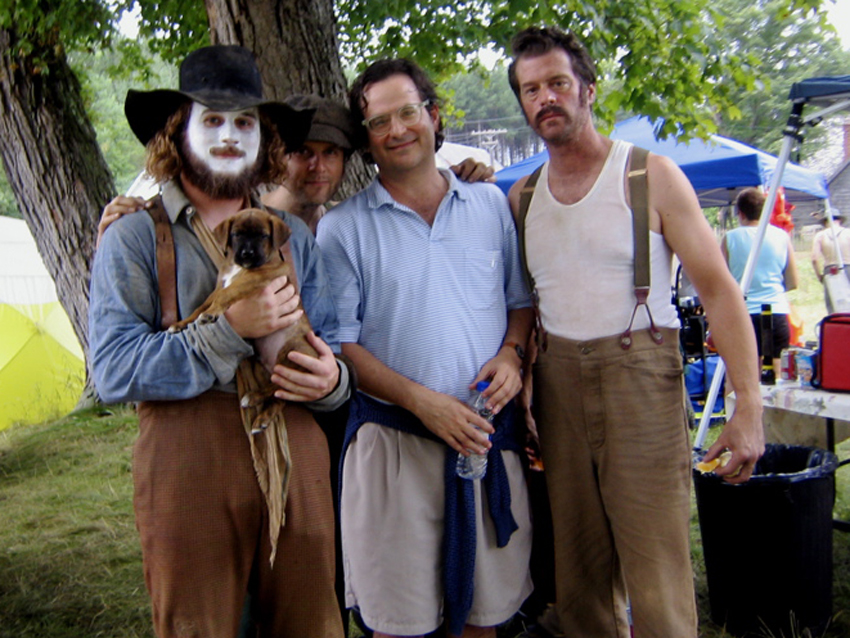

Randall Poster (left) poses with an extra on the set of Wes Anderson's The Darjeeling Limited.
Martin Scorsese, Wes Anderson, Todd Haynes, Richard Linklater, Sam Mendes - while many folks dream of working with just one of these famed directors, music supervisor Randall Poster has all of them on his day planner - and more.
Since he first burst on the scene, overseeing the music for Larry Clark's controversial film Kids, Poster has set the beat for some of the world's most creative filmmakers and helped them tell their daring, highly personalized stories.
Dispensing with the usual approach to soundtracks (the big artist doing the big song with the big video), Poster's encyclopedic mental jukebox, along with an uncanny sense of what a scene needs to make the strongest impact, has changed the way audiences hear - and experience - movies and TV. Even a casual perusal of his resume boggles the mind while bringing a smile to one's face: Rushmore, Velvet Goldmine, Up In The Air, Revolutionary Road, School Of Rock, Far From Heaven, Lost, Fantastic Mr Fox, Boardwalk Empire, Hugo - the list goes on and on.
MusicRadar sat down with Randall Poster to discuss how he got in the business of putting sound to images, how he functions in his role, and to ask that burning question: Has he ever had his heart broken by a song he couldn't get for a film?
Let's say I've got a kickass music collection and love movies. How can I become a music supervisor?
"Find some friends who are making a movie and have them let you do it. That's my advice to anybody who wants to do this sort of thing - start making movies with your friends.
Get the MusicRadar Newsletter
Want all the hottest music and gear news, reviews, deals, features and more, direct to your inbox? Sign up here.
"I started out that way. I graduated from college without any real professional direction - but I always loved movies. So, to try to keep myself out of law school, I wrote a script called A Matter Of Degrees with a friend about a college radio station.
"I had gone to Brown University, and while I was there the station went from a free-form format to something very commercial. So the script kind of mourned the loss of freedom that comes with professional responsibilities.
"We developed the movie at the Sundance Institute and got it made. I wasn't the music supervisor - I was a producer - but there was a lot of music that was recorded for the film. Coming out of that, I decided that I wanted to work with great directors, and I wanted to focus on putting great songs and music in movies."
One would assume your role changes from film to film, but in general, what is it that you do?
"It does change, sure. But generally, what I do is I read the script and get a sense of what kind of music can work and push things forward.
"Music gets into a movie in stages: Sometimes there's an on-camera element, where actors are actually performing the music, or there could be a scene where music is being performed, and so I have to deal with that. When I read a script, I look for those elements and figure out what needs shot and what needs to be done during the production period.
"During post-production, that's when I figure out where I put in the music and what songs should be playing on car radios or during montages and certain sequences. I'll work with the director in a way to sort of conceive and execute the musical element of the movie."
You've never gone down the standard route of movie soundtracks - the big band doing their big hit song, with the big, expensive video…
"No, not at all. That was never my strong suit, nor was that anything I've ever been interested in. I was interested in working with great directors and having the music serve the movie.
"Things change in the business, too. If you think back to the days when movie soundtracks were really collected on a large scale, the labels got engaged in the movie-making process, and they were another voice that drove the filmmakers and the film production companies to be more commercially friendly or attuned to something that was happening at the moment for the sake of the marketing support they could get. But I was never pivotal in that kind of filmmaking, so I never had to change the way I was doing things."
Your work with Wes Anderson is basically collaboration. It's hard to think of another director and music supervisor who work so closely.
"The music identity of Wes' movies really relies on Wes' genius. If I'm his aide de camp or collaborator, you know, so much of the sound and the success is based on his ability to incorporate music in really unique ways in his films.
"Moonrise Kingdom will be the seventh film we've done together, and I think the benefit of our ongoing relationship is that we get a lot of work between the movies. At lot of the time, we'll start the dialogue on a movie before there's even a script - that gives us a real jump on things."
Has there ever been an instance during the script stage where your choice for a song actually altered the direction of a scene?
"Well, to point to something tangibly, the film Fantastic Mr Fox ends with Bobby Fuller singing Let Her Dance, and that was a song I played for Wes 10 years ago. We kind of said, 'OK, we'll put that one away.' We knew that we wanted to use it, but we didn't know where, so I took it and didn't play it for anyone, and I put it away in what I call 'my safe.' Then, when the opportunity presented itself, we were ready.
"There was one song that got away from me, though. There was a blues singer - may she rest in peace - named Katie Webster, who had a song called Never Let Me Go. I had never heard it before, but one day I was driving and it came on the radio. I literally pulled over to the side of the road to listen to it - and I was praying that they would back-announce it so that I'd know what it was. Luckily, they did.
"I probably tried to put it in 10 movies, and it just never stuck. Then one night, I was watching True Blood, and there it was in the end credits. I called Gary Calamar, who's the music supervisor for True Blood, and I said, 'Katie Webster… Never Let Me Go… fuck you!'" [laughs]
You and Wes Anderson undoubtedly share a love of certain kinds of music. What about your differences, though? Have you ever opened his ears to something that you thought he wouldn't like?
"With any of the directors I've worked with, it can get rough and tumble sometimes - you want them to hear a particular piece of music or to appreciate what something is doing for a scene. In those situations, sometimes you win and sometimes you lose. But the truly great directors appreciate it when you fight a little bit."
Anything you can share about what we can expect musically in Moonrise Kingdom?
"I can tell you that it's a period film - it's set in 1965 - and there's a very strong classical musical element in the movie. That's all I can say right now. But here's a wonderful benefit of my work, because classical music is something I'm not very grounded in, so it's been a real learning process for me."
But have you found a way to mix in any British rock?
"Ahhh, you'll have to wait and see." [laughs]
You and Wes have used The Rolling Stones in pretty much every movie.
"We've used them a lot, that's true, and it's been fun - especially since we've been putting our records out through ABKCO. It's been great to have The Rolling Stones as sort of our house band. Their music works very well - I'm sure we'll use them again."
You've also worked with Todd Haynes quite a bit. What are his musical sensibilities?
"Todd is very interesting. He comes at music with almost a delirious fan's point of view, but he can also get very academic in his research. So there's a director who, when you collaborate with him, and he'll say he wants something like Dylan or glam-rock, you're really in for some lessons because he's covered the territory."
Let's talk about Boardwalk Empire. Martin Scorsese certainly knows his music.
"Yes, he does. It's funny, because with Boardwalk Empire, the first season was set in 1920-21, very early, and all of us had to brush up on what was happening then. Marty would say that his grounding in music starts in, like, 1925. He and I had worked together on The Aviator, which was also set in the 1920s, but Boardwalk Empire is earlier. It's before there was radio. Music was just transforming into jazz."
Because your job on Boardwalk Empire has been archeological in a way, is it harder for you than other projects?
"No, not harder. Actually, it's great to be able to switch gears sometimes. When you have to do the research, it's fun. And it's a scenario where you know that something you like isn't going to be used in another movie or TV show."
The use of the Brian Jonestown Massacre in the opening credits is pretty great.
"People give me credit for that, but I have to say, in all honesty, it didn't come from me. I probably would've lobbied to use something more period specific - that's what I was so into at the time. Using that was from the HBO side, so all credit where credit is due. It's controversial - and I see where some people don't understand it - but it does work to contemporize the show."
It's interesting that you haven't done a real movie musical yet, something like Chicago.
"No, no, I haven't. I did Country Strong a few years ago, which was pretty musically driven. I haven't really entered the realm of the Broadway conversion. In many ways, something like that is so time consuming, and I need to have a little bit more flexibility."
Are there any directors you haven't worked with that you'd like to? You and Paul Thomas Anderson would be a good fit.
"You know what? I love Paul Thomas Anderson's movies, but I have my Anderson. Right now, I'm more interested in emerging directors. Sean Durkin, who did Martha Marcy May Marlene, is a director I'd really like to talk to. And Cary Fukunaga, who did Jane Eyre recently, he's somebody I'd like to work with. I just wish some of my directors made more movies."
How do you function with score composers - somebody like Mark Mothersbaugh, for example?
"That's a situation where it depends on the director's relationship with the composer. I'm there to help and to see if we can agree on a vocabulary for the music. For instance, I work with Sam Mendes, and he has a relationship with Thomas Newman who does the score for his movies, so there isn't much for me to do there except set the stage for the music with certain songs.
"I really like working with Howard Shore, and he's very interested in the stuff I'm doing. On the film Hugo, we recorded a lot of this French musette, and I think that inspired him to figure out the palette of his score. If I work with directors who are less experienced, I try to just talk to them, like, 'Here's where this can go,' and I act like a sage adviser, giving them the possibilities."

Poster (center) on the set of Todd Haynes' I'm Not There, with (from left) Jim James, John Convertino and Joey Burns.
Has there ever been an instance where you had your heart broken because of a song you just couldn't get?
"You know, part of my reputation is based on the fact that I just don't let that happen. I've had my heart broken a little bit when a director chose a piece of music over something I really wanted. Generally, though, if there's something that I know can work, I'll figure out a way to get it."
Joe is a freelance journalist who has, over the past few decades, interviewed hundreds of guitarists for Guitar World, Guitar Player, MusicRadar and Classic Rock. He is also a former editor of Guitar World, contributing writer for Guitar Aficionado and VP of A&R for Island Records. He’s an enthusiastic guitarist, but he’s nowhere near the likes of the people he interviews. Surprisingly, his skills are more suited to the drums. If you need a drummer for your Beatles tribute band, look him up.










